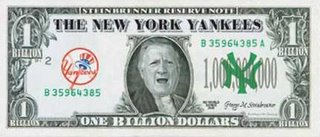Other Yankee Blogs
Baseball's SaviorBronx Banter
Canyon of Heroes
Count the Rings
Crosstown Rivals
Futility Infielder
High and Tight
I'm No Idiot
LoHud Yankees blog
No Maas
No Sense Worrying
NYY News
Pending Pinstripes
Pinstripe Alley
Pinstriped Blog
Pride of the Yankees
River Ave Blues
RLYB
Sporting Brews
Sports World NY
Unbiased Yankee Fan
Was Watching
Weblog That Derek Built
Yankees Baseball Blog
Yankees Prospects
Yanks Blog
Yanks Fan vs. Sox Fan
Weekly Poll
Thanks For Visiting
Friday, February 10, 2006
'Tis the season for projections
Spring training is so close you can practically smell the fresh cut grass and hear the popping of the catcher's mitt. It's that time of year when experts and amateurs alike put their 2 cents in and try to predict the future, so here we go:
SG at Replacement Level Yankees Weblog went through the Diamond Mind Baseball simulation motions and projects the Yankees to post 85 wins in 2006.
Steve Lombardi over at WasWatching.com got the projection bug about a week later, and projected the Yanks to total 87 wins in 2006.
Rob LaBrie of SportsColumn.com fame is thinking 90 wins for 2006.
Tom Singer at MLB.com doesn't give a number, but he sees a second place finish for the Yanks in 2006, with the Blue Jays taking the division.
With that, I thought I'd take a crack at 2006 projections. I'll cut to the chase and give you my projection now, with the explanation of how I got to that number to follow.
IGWT's Yankees 2006 projected win total: 98
That's a better win total than 85 or 87 (if you're a Yankee fan), and here's how I came to that number:
SG at Replacement Level Yankees Weblog went through the Diamond Mind Baseball simulation motions and projects the Yankees to post 85 wins in 2006.
Steve Lombardi over at WasWatching.com got the projection bug about a week later, and projected the Yanks to total 87 wins in 2006.
Rob LaBrie of SportsColumn.com fame is thinking 90 wins for 2006.
Tom Singer at MLB.com doesn't give a number, but he sees a second place finish for the Yanks in 2006, with the Blue Jays taking the division.
With that, I thought I'd take a crack at 2006 projections. I'll cut to the chase and give you my projection now, with the explanation of how I got to that number to follow.
IGWT's Yankees 2006 projected win total: 98
That's a better win total than 85 or 87 (if you're a Yankee fan), and here's how I came to that number:
- First, using Baseball-Reference.com, I took all the Wins, Runs Scored, and Runs Allowed data for every AL team since the last expansion in 1998 and tabulated it to get each team's run differential (that's 112 data points total).
- I plotted each team's number of wins versus it's run differential, and got this fancy little chart (sorry if can't read it, Blogger isn't very friendly when it comes to inserting tables into posts):
 The 2 high points are the 1998 Yankees and the 2001 Mariners, while the 2003 Tigers get the joy of having the lowest point on the chart. Obviously, there's a relationship between Run Differential and Wins, a relationship I used in this projection.
The 2 high points are the 1998 Yankees and the 2001 Mariners, while the 2003 Tigers get the joy of having the lowest point on the chart. Obviously, there's a relationship between Run Differential and Wins, a relationship I used in this projection. - I added a trendline to chart in order to get the equation of the line, which describes the Run Differential-Wins relationship (it's about time I put that Civil Engineering degree on working to some good use). Instead of getting one equation and therefore only one relationship, I used 7 trendlines and got 7 different relationships (for the geeks like me out there: I ended up with a linear, exponential, and 2nd through 6th order polynomial equations for the relationship).
- With the relationships between Wins and Run Differential at hand, all I needed were projected values for how many runs the Yankees would score as well as give up. Using RotoChamp.com's 2006 fantasy projections as well as BaseballThinkFactory.org's 2006 ZiPS projections, I totaled how many runs they expect the Yankees to score and surrender next year. Here's that data:
It's definitely fair to say the Runs Scored/Allowed values are low, but they aren't crucial. It's the Run Differential that'll control this project, and those values are very reasonable. It's kind of interesting how both project the Yanks to surrender the same number of runs though. Hmmm...RotoChamp ZiPS Runs Scored 776
818 Runs Allowed 630 630 Run Differential +146 +188 - Using the aforementioned relationships and the projected data above, I calculated how many wins each equation predicts for 2006. Here that is:
RotoChamp Wins ZiPS Wins Equation 1 95.970
100.267 Equation 2 96.470 101.852 Equation 3 95.999 100.366 Equation 4 96.014
100.385 Equation 5 96.023 100.383 Equation 6 95.991 99.297 Equation 7 96.994 100.247 - Finally, I took the average of those 14 projected totals, rounded it off to a whole number, and walla, 98 wins.
Hopefully I didn't turn too many of you off from the blog with all the geek talk, but hopefully I nailed the prediction and we're headed for a 98 wins season, which should be good enough to take the division. Again.
1 Comments:
 Anonymous said...
Anonymous said...
Looks to me that the regressions are about right. If all are healthy, 975-1000 runs, 98-104 wins, and 27 ring are all in reach.
Non-Yankee Blogs Worth Your Time
6-4-2Aaron Gleeman
Amazin' Avenue
Athletics Nation
AZ Snakepit
Ballpark View
Balls, Sticks & Stuff
Baltimore Chop
Baseball Analysts
Baseball Crank
Baseball, Etc.
Baseball Musings
Beyond the Box Score
Bleed Cubbie Blue
Bless You Boys
Bluebird Banter
Brew Crew Ball
Bucs Dugout
Buster Olney's ESPN blog
Camden Chat
Cardinals Diaspora
ChiSox Daily
Crawfish Boxes
Cub Reporter
DA Humber : Baseball Central
Daily Lancer
Detroit Tigers Weblog
Dodger Thoughts
Doug's Business of Baseball
DRays Bay
Ducksnorts
Eddie Kranepool Society
Elephants in Oakland
Faith & Fear in Flushing
Federal Baseball
Fire Brand of the AL
First Inning
Fishstripes
Gaslamp Ball
Good Phight
Halo's Haven
Honest Wagner
Independent Thinking
Inside the Dodgers
Inside the White Sox
Jayson Stark's ESPN blog
Joy of Sox
Let's Go Tribe
Lookout Landing
Lone Star Ball
Major League Blog
McCovey Chronicles
Mets Blog
Mike's Baseball Rants
Minor League Ball
Only Baseball Matters
Orange and Black Baseball
Over The Monster
Peter Gammon's ESPN blog
Phillies Nation
Purple Row
Redleg Nation
Red Reporter
Rival Fish
Royals Authority
Royals Corner
Royals Review
South Side Sox
Talking Chop
Transaction Guy
Twinkie Town
USS Mariner
Viva El Birdos
The Template is generated via PsycHo and is Licensed.









